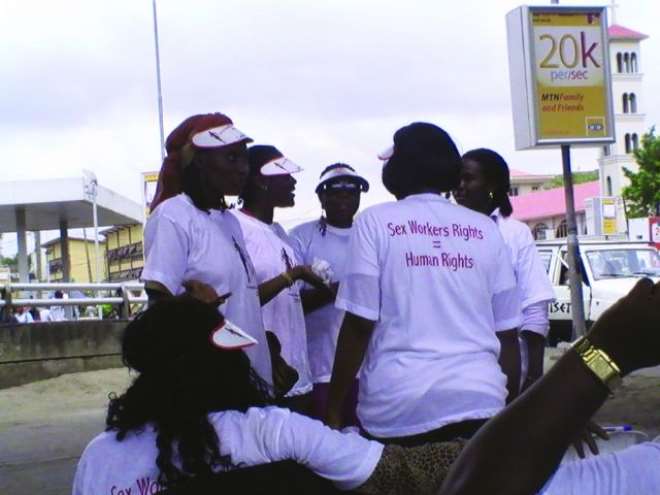‘Blessed are the Sex Workers’
“This sex work o, I never see your kind o, this sex work o, blessed are the sex workers.'' The bold lady leading the song above danced gaily with her colleagues under the Falomo Bridge, Ikoyi, Lagos. At first, the spontaneous song from her brightly coated lips sounded awkward, but soon gained momentum with the spice of a live band. On Thursday, March 3, the mood was relaxed and the weather was right when sex workers in Nigeria celebrated the International Sex Workers Rights Day with fanfare.
Sex Workers Day? Yes. Sex workers, popularly called prostitutes or asewo, in 125 countries including seven African countries like Kenya, Botswana, Uganda, South Africa have picked March 3 of every year as a day to advocate for the legalisation of sex work. And if you think this is laughable, the sex workers are of the opinion that Nigeria, which is signatory to the International Declaration on Human Rights and other protocols is bound to respect the rights of the sex workers and decriminalise the trade.
So to the streets, they trooped, dancing and signing about their rights. The ladies, old and young, 'packaged' themselves in T-shirts and fez caps with inscriptions stating the rights of sex workers. The ladies sure meant business. For the first time, sex workers in Nigeria publicly teamed up with their international counterparts under the name, Africa Sex Workers Alliance, ASWA.
According to Margaret Onah, ASWA coordinator, the day is very important to stop “the human rights violations against sex workers and to build in its place an enabling human rights environment in which sex workers enjoy the full scale of their rights. This include being afforded equal protection of the law and opportunity to practice sex work without fear of prejudice in their communities,'' she said.
Initially, the programme schedule was for a rally to terminate with a press briefing at the United Nations Information Centre, UNIC, on Kingsway Road, Ikoyi, Lagos. But after a sweat-soaking walk around Ikoyi, authorities at UNIC refused to have anything with the group. Undaunted, the sex workers, accompanied by officials of some non-governmental organisations, headed for the expansive culvert beneath the Falomo bridge, ready to roll the tape.
In the full glare of the public, the sex workers danced to their own lewd songs unmindful of side glances and curious stares thrown at them.
After the appetiser, Ijeoma Chinakwe, a project officer with BAOBAB for Women's Rights, a non-governmental organisation based in Lagos, charged the ladies to “be proud of what you are doing. Do not let anybody trample on your rights. Everybody passed through something before they became what they are today,” she told the approving crowd.
Eva Inakwa, an official from the Skylife Youth Development Initiative, is of the opinion that sex workers' rights are human rights and so they should not be stigmatised based on their profession. She said, “We are human beings and we are women. We have rights just like every other man. Being a woman does not make us inferior or being sex workers does not make you animals,'' she said.
Speaking with the magazine, a middle-aged sex worker who prefers to be known as Pat, agrees with Inakwa. She is worried that many people see sex workers as animals; she is optimistic that the situation would change. “We have a right to go to the market. We have a right to enter an office and if somebody asks you what you are doing, tell them that you are a sex worker and the person will see that you are proud of what you are doing.'' An indigene of Rivers State, Pat does not see anything wrong with her trade. “You that wake up in the morning, bath, wear your suit, go to the office, have the same rights that I have because you work for money and sex workers work for money also. We are freedom fighters, that is why we are here fighting for our rights,'' she said.
Onah is of the opinion that government should embrace and rehabilitate sex workers because stigma fuels HIV spread. “It is very important to accept them as human beings. Most of these sex workers are HIV negative and we have young housewives infected with HIV. Do not forget that most of the HIV data we have now is from antenatal clinics. This shows us that they were infected by their husbands. We have to embrace these people because they sleep with men who also have wives and girlfriends and this is very risky,'' she said.
The first International Sex Workers Rights Day was held in 2001, when sex workers from southern, western and eastern Africa came together to spearhead the fight for sex workers rights in Africa. That year, more than 25,000 sex workers gathered in India for a festival organised by the Durbar Mahila Samanwaya committee, a forum of 65,000 sex workers, based in West Bengal, India. Mahila Samanwaya, which is derived from an Indian language, means unstoppable. Their main objective is to fight for recognition of sex work as 'work' and sex workers as 'workers'.
Latest News
-
 Actress Biodun Okeowo Celebrates Lege Miami On His
Actress Biodun Okeowo Celebrates Lege Miami On His -
 Davido's 'With You' Ft Omah Lay Official Video Hi
Davido's 'With You' Ft Omah Lay Official Video Hi -
 "I'm Ready For My Next Husband" - Ka3na Reveals
"I'm Ready For My Next Husband" - Ka3na Reveals -
 "I Humbly Suggest You Bring Back The Cashless Poli
"I Humbly Suggest You Bring Back The Cashless Poli -
 Yul Reacts To Photo Of New Born Daughter Being Use
Yul Reacts To Photo Of New Born Daughter Being Use -
 Burna Boy Reveals That He Is Considering Having Ki
Burna Boy Reveals That He Is Considering Having Ki -
 "Nollywood's Growth Requires Sacrifices From Curre
"Nollywood's Growth Requires Sacrifices From Curre -
 "Everyday With You Is A Blessing" - D'banj Celebra
"Everyday With You Is A Blessing" - D'banj Celebra -
 Nkechi Blessing Flaunts New Man On Social Media, D
Nkechi Blessing Flaunts New Man On Social Media, D -
 Yhemolee Celebrates Son As He Clocks Six Months
Yhemolee Celebrates Son As He Clocks Six Months














